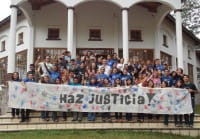With 20 murders committed every day, the United Nations ranks Honduras as the most violent country in the world. Hondurans themselves consider violence and insecurity to be the country’s main problems. Organised crime has influence at every level of the state. Drug traffickers have public officials at their service and this stops justice from being done.
At a local level, gangs are in control in the urban neighbourhoods and districts, as well as in the rural villages and hamlets. They are active right through from the street dealing of hard and soft drugs (marijuana, cocaine, amphetamines) to extortion, kidnapping and murders committed against their own neighbours, often under the protection of members of the police and armed forces. No-one in Honduras needs convincing of the urgent need to prevent violence and change the current state of affairs.
Building bridges
The question that arises in such a situation is how we, as Christians and churches, take up the prophetic challenge to ‘maintain justice and do what is right’ (Isaiah 56:1) in the midst of such serious violence, and when fear is real and paralysing. Yet despite this apparently desperate situation, seeds of hope have been sown and are now beginning to bear fruit. One such seed is the Christian Alliance for Dialogue and Conciliation (Alianza Cristiana por el Diálogo y la Conciliación), which emerged as an initiative of the Church and organisations following the 2009 coup d’état in Honduras, which left the country deeply divided and contributed to the current climate of violence. The Alliance initially began by creating spaces for dialogue and reconciliation between groups in conflict under the banner of ‘Building Bridges to Peace’. It has since changed its focus to inspiring and mobilising the Church about violence prevention because members of churches are themselves living in violent areas and can play a key role in building peace.
Practical prevention work
It has become clear that the best antidote to violence – both now and in the future – is prevention, and who better to work with than children and young people at risk? Together with the Bible Union of Honduras (Unión Bíblica de Honduras), the Alliance has promoted the ‘Stop the violence – a message from God’ programme aimed at young people in the country’s schools. The programme originated in Argentina, where its aim was to prevent violence among football fans. In Honduras, with the permission of the Ministry of Education, hundreds of church volunteers have been trained in preventing violence in schools and are running a programme of 15 weekly lessons, helping young people to make the right decisions. The programme has inspired 10 per cent to 15 per cent of the young people to commit to becoming ‘agents of change’, tasked with preventing violence and bullying at school.
Supporting victims
Another member of the Alliance, the Association for a More Just Society (Asociación para una Sociedad más Justa – ASJ), was established by committed Christians in 1998 and has been fighting to make the justice system accessible to the most vulnerable sectors of society. One of its most successful initiatives is the Gedeón Programme, which, from its offices within churches in poor communities, offers psychological care and legal advice to victims of violence or people with other legal or psychological problems. Given that most victims of violent crime (extortion, robbery, rape, murder at the hands of local gangs) have never been able to make an official complaint, the ASJ decided to go one step further and establish the Peace and Justice Programme (Programa Paz y Justicia) aimed at meeting the needs of, and providing support to, victims. Paz y Justicia has a team of lawyers, researchers and psychologists working closely with victims and witnesses to ensure that justice is done. Paz y Justicia forms a bridge between the forces of law and order and the community. The programme:
- conducts investigations
- provides support for victims during the legal process
- offers psychological care to restore their emotional well-being.
Paz y Justicia’s work in the communities has resulted in a 60 per cent drop in the crime rate and, to date, more than 100 convictions of individuals and criminal groups. This successful model of cooperation between the community, state and civil society is now being extended to new communities.
United for peace
On a national level, the Alliance for Peace and Justice (Alianza por la Paz y la Justicia – APJ), a movement initiated by Christians, is campaigning for better public safety and demanding changes in the justice system that will ensure that Honduras is a country that respects the rule of law and delivers justice for victims of violence. This alliance has had a substantial impact and is unique to Honduras in that very different sectors have embraced its vision: it includes NGOs, Evangelical and Catholic churches, labour unions, businesses, universities and so on.
The Evangelical Fraternity of Honduras (Confraternidad Evangélica de Honduras), which provides national representation for most of the Evangelical churches, is also an Alliance member. Honduras needs the body of Christ to raise a prophetic voice against injustice and inequality, and for lawyers, psychologists, journalists and other Christian professionals to use their knowledge in the service of the poor and vulnerable.
Miriam Mondragon is Coordinator of the Christian Alliance for Dialogue and Conciliation (Alianza Cristiana por el Diálogo y la Conciliación).
Group discussion questions
- What did you learn from this article?
- What issues of violence are there in your community?
- How could you be part of preventing violence?
- What kind of resources would you need for this work?
- Who could you work alongside to bring transformation?
More information
- Asociación para una Sociedad más Justa: (Spanish) www.asjhonduras.com (English) www.ajshonduras.org
- Alianza por la Paz y la Justicia: www.alianzapazyjusticia.com







